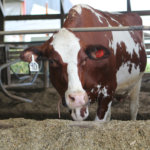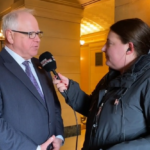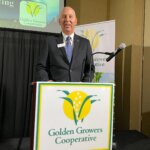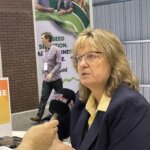
A Weekly Update from the Red River Farm Network
Monday, March 27, 2023
Waiting for Spring-Winter refuses to release its grip on the Northern Plains and Upper Midwest. Farmers and ranchers throughout the region are praying for spring conditions to arrive. The Red River Farm Network delivers agricultural weather twice per day featuring World Weather Incorporated Senior Ag Meteorologist Drew Lerner. You can hear Drew’s forecasts each morning and midday on the airwaves. An audio version of these weather casts can also be found online twice a day. If your business depends on Mother Nature, you need to depend on Drew Lerner and the Red River Farm Network.
Interest Rates Increase 25 Basis Points – Interest rates are now at the highest level since September of 2007. The benchmark rate was increased another quarter-percentage point and is now in a range of 4.5-to-five percent. Federal Reserve Board Chairman Jerome Powell said the economy was doing better than expected since the last Federal Open Market Committee meeting. However, the recent bank failures will likely result in tighter credit conditions and a different tone from the Fed. “We no longer state that we anticipate that ongoing rate increases will be appropriate to quell inflation. Instead, we now anticipate that some additional policy firming may be appropriate.”
China and Russia Driving ‘Change’ – During their meeting in Moscow, Chinese President Xi Jinping and Russian President Vladimir Putin emphasized their tight political and economic relationship. Following a state dinner Tuesday night, Xi said the world is seeing historic changes with China and Russia driving that change.
MO Senator Pushes Back on China – Missouri Senator Josh Hawley has introduced a bill to permanently repeal normalized trade relations status with China within two years. Normalized trade has been in place since 2000. Hawley’s proposal would allow the United States to place higher tariffs on Chinese imports.
China Agrees to Resume Brazilian Beef Imports – Sales of Brazilian beef were shut down a month ago after an atypical case of BSE was confirmed. China is Brazil’s leading beef export customer.
Lula Trip to China Postponed – After being diagnosed with the flu, Brazilian President Lula has canceled this week’s trip to China. Brazil’s agriculture minister arrived in Beijing last week, but the signing of any trade agreements between the two countries has been postponed.
Russian and Turkish Leaders Discuss Grain Deal – Russian President Vladimir Putin spoke by phone with his Turkish counterpart over the weekend, discussing the Black Sea Grain Initiative. Putin was reportedly thanked for his role in extending the grain deal. The original deal and the first extension were in place for 120 days, but Russia would only commit to a 60 day time period in the latest negotiations.
West Coast Port Delays – Labor negotiations between the Pacific Maritime Association and West Coast dockworkers are stalled. The ocean carriers claim unionized port workers are purposely slowing down the handling of cargo at the ports of Los Angeles and Long Beach. The PMA says dockworkers have stopped staggering their shifts during mealtimes, backing up trucks and interrupting cargo movement. The union employees have been working without a contract since last July.
Trade Enforcement Emphasized in Senate Hearing – U.S. Trade Representative Katherine Tai testified before the Senate Finance Committee Thursday, touting the Biden Administration’s trade agenda. That includes a new record in agricultural exports in 2022. Enforcement action, including efforts on dairy trade to Canada and biotech corn to Mexico, were cited.

Thune Criticizes Biden Trade Agenda – South Dakota Senator John Thune went to the floor Thursday and challenged the administration’s trade policy. “Trade has been a very low priority on the President’s list throughout the first two years of his administration,” said Thune. “To name just one example, it took the President a year-and-a-half to nominate a confirmable chief agricultural negotiator at the U.S. Trade Representatives’ Office.” Thune went on to say President Biden has de-emphasized free trade. “The administration is currently negotiating exactly zero comprehensive free trade agreements and its so-called trade initiative frameworks are largely flowery rhetoric.” Thune said the United States could easily reenter the trade arena by wrapping up the trade agreement with the United Kingdom.
Vilsack to Testify, Testify, Testify – Agriculture Secretary Tom Vilsack will make three trips to Capitol Hill this week. Vilsack is scheduled to testify before the House Agriculture Committee tomorrow. The USDA leader will face the Senate Ag Appropriations Committee on Wednesday and the House Ag Appropriations Committee on Thursday.
ND Judge Rules on WOTUS Case – A federal judge in North Dakota is allowing farm groups to intervene in the ongoing legal battle over the Waters of the United States rule. North Dakota Judge Alice Senechal will consider a motion from 24 states for a preliminary injunction. Without the court action, separate lawsuits would likely be filed in each of those 24 states. Earlier in the week, a federal judge in Texas granted an injunction for Texas and Idaho, but denied a motion for a national injunction. The groups allowed to intervene in the North Dakota case include the American Farm Bureau Federation, National Cattlemen’s Beef Association, National Corn Growers Association, National Pork Producers Council and others.
NCBA Disappointment of WOTUS Ruling – The U.S. District Court in the Southern District of Texas denied a national preliminary injunction that would have halted the Biden administration’s Waters of the United States rule from taking effect. National Cattlemen’s Beef Association’s Chief Council Mary Thomas-Hart was disappointed in the ruling. They had hoped for an injunction until the Supreme Court issues it’s opinion in the Sackett v. EPA case. “Unfortunately, the court did not listen to us, did not grant a nationwide injunction, only granted an injunction for Texas and Idaho and for the other 48 states, the Biden WOTUS Rule will go into effect today,” said Thomas-Hart. “The biggest issue with the Biden WOTUS Rule is that it fails to clearly define which features are in and which are out.” Find the full interview with Mary Thomas here.
Technical Assistance Requested in the New Farm Bill – A national coalition of 135 farm groups has sent a letter to congressional leadership, calling for dedicated Farm Bill funding for one-on-one technical assistance for small-and-medium sized farms. With rising land prices and farm input costs, the coalition said additional technical assistance is needed. The groups signing the letter include the American Farmland Trust, Minnesota Farmers Union and the National Sustainable Agriculture Coalition.
Help Available for Livestock Losses – The USDA is offering technical and financial assistance to help farmers and ranchers recover from recent winter storms in Minnesota, North Dakota, South Dakota, Idaho and Wyoming. Impacted producers can contact their local USDA Service Center to report losses and learn about the options. Under Secretary for Farm Production and Conservation Robert Bonnie says livestock producers are dealing with increased feed expenses and snow removal costs.
Market Awaits Acreage Report – Midwest Market Solutions President Brian Hoops says the trade has shifted its focus to the USDA planting intentions report at the end of the month. Spring weather will also become a major mover. “It could be a very delayed spring across the Midwest.”
What’s Hot, What’s Not in the Markets – In this week’s edition of What’s Hot, What’s Not in the Markets, Martinson Ag Risk Management President Randy Martinson said canola is leading the charge to start the week. With strong demand, the market may be trying to buy some acres. What’s not hot? “We have to go with the meat sector; we’re still concerned about what is happening with the banking industry and the econmy.”
Private Acreage Estimate Released – IHS Markit is out with the latest private estimate on crop acreage. Formerly known as Informa, IHS is forecasting corn acreage at 90.9 million and soybean acreage at 88.2 million. The corn estimate is up 400,000 acres from last month’s forecast while soybeans are up 200,000 acres.
Brokerage Firm Announces Acreage Projections – AgMarket.Net is forecasting corn acreage at 91.3 million, “The company feels as if we might pick up swing acres due to the amount of money that’s been made, strong soybean acres during the 2022 growing season and fertilizer prices dropping quite a bit over the last several weeks,” said co-founder Matt Bennett. AgMarket.Net is projecting soybean acres at 87.9 million and the all-wheat figure at 49.1 million.
Farm Futures Forecasts More Beans, Less Corn – According to a survey conducted by Farm Futures magazine, U.S. corn acreage will total 87.6 million acres. That’s down from 88.5 million one year ago. Soybean acreage is forecast at 89.6 million acres, up from 87.5 million in 2022. Spring wheat seedings are estimated at 10.1 million acres. That’s down more than six percent from last year.
Brazilian Production Offsets Argentine Crop Losses – AgroConsult expects Brazil to export a record 96 million tons of soybeans this year. Soybean production is estimated at 155 million metric tons, up 2 million metric tons from the last forecast. Meanwhile, South American crop consultant Michael Cordonnier is going the other direction with the Argentine soybean crop. Cordonnier is projecting Argentina’s soybean production at 26 million metric tons, down two million tons from his last estimate.
Dry Bean Scene – University of Minnesota Extension Integrated Pest Management Specialist Bruce Potter joins us to talk about the spread of the soybean gull midge, which uses dry beans as a host. The Dry Bean Scene is sponsored by the Northarvest Bean Growers Association.
E15 Emergency Waiver Sought – Minnesota Governor Tim Walz, South Dakota Governor Kristi Noem and their counterparts in Iowa and Nebraska are asking for an emergency waiver to allow 15 percent ethanol blends to be used this summer. EPA Administrator Micheal Regan approved year-round sales earlier this year, but delayed implementation until April of next year. The governors said farmers, consumers, retailers and ethanol producers need certainty and urged EPA to act immediately.
Next-Gen Fuels Act Returns – Minnesota Senator Amy Klobuchar and Iowa Senator Chuck Grassley have re-introduced the Next Generation Fuels Act. This proposal would give ethanol a larger role in bringing down the level of carbon emissions nationwide. It is also designed to lower prices at the pump and reduce volatility in the ethanol market.
Ethanol’s Economic Impact – According to a new study by the University of Minnesota Extension, Minnesota’s ethanol industry contributed $2.7 billion to the state’s GDP last year. The industry produced 1.34 billion gallons of ethanol last year, up from 1.27 billion gallons in 2021. That resulted in $8 billion in economic activity and supported 26,000 jobs in the state.
Livestock Groups Lobby for Expanded Packer Capacity – Major livestock groups have signed off on a letter to House and Senate agriculture committee leadership, showing support for legislation to allow livestock market owners to own or invest in small or regional packing facilities. The farm groups call this an outdated rule and more must be done to increase packer capacity and add competition for producers. The letter was signed by the American Farm Bureau, American Sheep Industry Association, Livestock Marketing Association, National Cattlemen’s Beef Association, National Pork Producers Council and U.S. Cattlemen’s Association.
Public Comment Sought on Electronic Ear Tags – The comment period for a USDA proposal requiring electronic identification for interstate movement of cattle and bison is being extended until April 19. The Agriculture Department claims this would strengthen animal disease traceability and improve the response to a disease outbreak. The issue of mandatory ID has been debated for over 20 years.
MN Beef Update – In the latest Minnesota Beef Update, Minnesota Beef Council Director of Industry Relations Jon Dilworth highlights this year’s ‘Top of the Class.’
Calving Concerns – The amount of snow on the ground could pose trouble for the calving season. “I know people who calve in April are expecting less snow and warmer temperatures,” said Laura Edwards, state climatologist, South Dakota. “It can lead to muddy pens and a lack of protection for those animals.” A slow melt-off would be the best scenario to prevent flooding. “We are looking at high potential of flooding in the James River, Red River of the North, and the upper regions of the Big Sioux River.”
Cow Liquidation Continued – Area auction barns are at the tail end of the feeder run. NDSU Extension Livestock Economist Tim Petry says prices were as good as he expected. “We had a really nice increase in feeder cattle prices this year, but it was the fourth year of cow liquidation.” The western states received rain, which Petry says helped spur the movement of lighter weight cattle.

A Position of Growth – Rabobank Global Dairy Strategist Mary Ledman will be featured at this week’s Central Plains Dairy Expo. Ledman says her focus is on opportunities in the dairy industry. “The U.S. accounts for about 15 percent of global dairy trade and I think there’s room to improve that number.” Compared to other parts of the world, the U.S. has fewer regulations. “Our share in global dairy trade is growing, mostly because we don’t see the same type of environmental constraints hindering production growth.”
Hog Markets Continues to Struggle – Steiner Consulting Economist Altin Kalo says the belly market has been burdened by too much supply. “We always talk about bacon and how important it is to this market and the big spike in belly and bacon prices last summer impacted what the food services did,” Kalo told RRFN. “They put a lot of product into cold storage which we’re still working through.” Kalo says seasonal demand won’t kick in until late spring or early summer.
Change to Corporate Farming Law Heard in Senate Ag Committee – Expanding animal agriculture in North Dakota has had a lot of attention in the state’s legislative session. House Bill 1371 was heard in the Senate Agriculture Committee and would expand ownership options for animal agriculture operations. North Dakota Department of Agriculture policy advisor Dutch Bialke said this bill would be beneficial to agriculture. “This proposed amendment to the North Dakota Century Code would be a huge step forward for the promotion, advancement, and growth of North Dakota’s animal agriculture industry,” says Bialke. Click here to track this legislation and learn more about the proposed bill.
Livestock Zoning Bill Reviewed – The North Dakota Senate Agriculture Committee took testimony on HB 1423 relating to a zoning review task force. Several agriculture organizations spoke in favor of the bill. North Dakota Farmers Union Director of Government Affairs Matt Perdue highlighting the regulatory relief. “I think it’s a great idea and a really good opportunity to update that zoning ordinance.” Perdue said NDFU does not support the language removing the county and township authority to exceed setbacks established in century code. To track this bill, click here.
Another Deadline Approaches in Bismarck – The North Dakota Legislature is facing a Friday deadline to get bills through the policy committees and on to the appropriations committee. The bills moving through the process include efforts to expand animal agriculture in the state, ban foreign ownership of agricultural land, a sales tax exemption for grain bins and increasing the speed limit on some portions of the interstate from 75 miles per hour to 80 miles per hour.
North Dakota Legislative Report – House Bill 1515, which would allow dairy farms to sell raw milk, is in the Senate at committee. North Dakota Senate Ag Committee Chair Larry Luick says there’s been a lot of interest in the bill. Listen to this week’s North Dakota Legislative Report to hear more.


RRFN Interview: Governor Tim Walz – In an interview with the Red River Farm Network, Governor Tim Walz said the budget reflects the needs of Minnesota agriculture. “We’ve got AGRI (Agricultural Growth, Research and Innovation program) dollars in there; we’re making sure that the infrastructure to expand E-15 is out there and making sure we’re on top of these diseases we see, such as avian influenza.” Walz also emphasized teh importance of reducing property taxes and investing in schools, roads, and bridges. “This desire to try and divide us, especially geographically, is a no-winner. Agriculture is a critical component to the state.” The interview can be found on RRFN’s YouTube channel.
Budget Targets Announced – The DFL trifecta in Minnesota has reached an agreement on budget targets. This framework typically is not determined until the last days of the session. However, House Speaker Melissa Hortman said the era of gridlock is over. “Too often you have seen in the past the leaders taking a really long time to give budget targets to the chairs and to the members of the legislature. At this point in time, we have targets that the chairs in the House and the Senate will get and the commissioners will get and they will now work together and when they are done with those bills, we will bring them to the floor and we will pass them.” The budget targets include nearly $18 billion in new spending, including $3 billion in tax cuts. The deal allocates $48 million for the agriculture budget.
MFBF Expected Different Budget Scenario – Minnesota Farm Bureau President Dan Glessing was surprised by the budget framework agreement and the $48 million budget allocation for agriculture. “We were certainly hoping to see more put toward agriculture. We’ll have some conversations and see if we can’t get agriculture properly funded,” said Glessing. “At the end of the day we’ll continue to fight for farmers and ranchers and consumers, they’re really the ones who reap the benefits of our food production.” The interview with Dan Glessing is available here.
Disappointment – The Minnesota Soybean Growers Association is upset with budget agreement announced by Governor Tim Walz and DFL legislative leaders. The $48 million target for agriculture is far below expectations, especially with the budget surplus of $17.5 billion. In a statement, Minnesota Soybean Growers Association Executive Director Joe Smentek said this proposal “seems to forget that agriculture plays a vital role in the state’s economic growth.”
A Full Plate for Farm Policy – There’s no shortage of agriculture related issues being addressed in the Legislature. Minnesota Agriculture Commissioner Thom Petersen says these concerns often extend beyond the purview of his department. “It may be issues like property taxes, school building referendums, the Beginning Farmer Tax Credit, avian influenza and they’re all incredibly important.” Petersen is closely watching the legislation dealing with the Minnesota Board of Animal Health. “The issue is if we’re going to grow the Board of Animal Health. It’s currently at six, but it was at five members for about 100 years. My concern is making sure we have a board that understands farming, agriculture and animal diseases.”

Omnibus Ag Policy Bill Moves to House Floor – The Minnesota ag finance bill is expected to be marked up in the House Agriculture Committee this week. The omnibus agriculture policy bill passed out of that same committee Thursday and is now on its way to the House floor. Committee Chair Samantha Vang was pleased with the bipartisan support for the bill. “I believe this is probably my first time using this line, it seems to be there’s peace in the valley so I’m happy to get the committee’s support.”
Speaking Out for Biodiesel – The Minnesota Soybean Growers Association spent time meeting with state legislators Wednesday. Beltrami farmer Mike Skaug, who is a past president of the organization, said biofuels are on the agenda. “Last year was our 20th year of biodiesel in the state, it contributes about 5,000 jobs and nearly $1.7 billion towards the state’s economy.” The State of Minnesota’s goal is a carbon-neutral economy. Skaug is concerned about that direction. “We feel biofuels are going to get lost in the shuffle and we don’t want to lose that momentum we’ve been gaining.” MSGA is also seeking a $3.5 million exclusion for the homestead tax credit to offset the increasing land values.
MFBF Minute – Minnesota’s legislative session is speeding by. Minnesota Farm Bureau Director of Public Policy Pierce Bennett gives an update on happenings on at Capitol in the latest MFBF Minute.
Wheat Growers Take Advantage of ‘Day on the Hill’ – Multiple farm groups were in St. Paul during National Agriculture Week to educate lawmakers. “We have a lot of new representatives and senators at the Capitol so it’s a good time for us to meet them and build a relationship,” said Austin Germolus, a board member with the Minnesota Association of Wheat Growers. The Ada farmer said it was difficult to focus on just a few priorities for this session. “I don’t even know where to begin. We have some key issues like the paid family medical leave bill that will affect rural families.”
MN Lawmakers Consider Paid Family Leave – Bills to create a wage tax in the State of Minnesota of .7 percent have been proposed to create a fund for paid family and medical leave. Halstad, Minnesota farmer Rachel Arneson says this is not the proper solution. “While it is a great concept, we need that to be a social and cultural shift, not legislation.” This bill would allow for up to 24 weeks of paid leave for employees to be taken consecutively. “You can imagine how that would impact planting, harvest or the factories. It’s very intimidating to think what could happen if we don’t get ahead of this now.” Both House File 2 and Senate File 2 are working their way through various committees this session.
Farmland Values Remain Robust – Red River Land Company President Chris Griffin says local farmers are the primary buyers, but there is also demand from investors. “We’re starting to hear a little more pushback on buyers with higher interest rates but generally still a very strong market.” Interest rates are a hot topic, but Griffin says there is more the story. “We’re facing a headwind with interest rates, but I think where commodity prices go into the fall is going to be a main driver of what land values do.”

Rail Problems Persist – Golden Growers Cooperative Chairman Mark Harless retired from the board after 12 years of service. Harless says rail issues continue to be the conversation post-pandemic. “We’ve had to cut back on the number of bushels we’re grinding in the Wahpeton plant because rail performance just isn’t keeping up. It costs us money and it costs our customers money.” Harless says production slows down when the plant idles due to lack of corn deliveries. “Contracts get backed up, and so far, we’ve been able to deliver but it may be an issue in the future.” Golden Growers Association hosted its annual meeting in West Fargo.
Flood Risk Rises – The risk for significant spring flooding in the Red River and Devils Lake Basins has increased and is now near or above long-term historical averages. Below normal March temperatures have delayed the spring melt. The timing of the spring thaw and the possibility of additional snow or rain are the most important factors for the flood risk.
UPL’s ‘Ask the Expert’ – In the UPL ‘Ask the Expert’ series, UPL Technical Service Manager Taylor Miller discusses the impact of early and late blight in potatoes. “One option for growers is UPL’s Manzate Pro-Stick; there have been no cases of resistance and it provides dependable, superior disease control for both pathogens.” Here’s the full interview.
Canola Minute – In this week’s Canola Minute, Northern Canola Growers Association Executive Director Barry Coleman discusses USDA recently released Crop Value Summary.
Weevils Pose a Threat to Sunflower Crop – NDSU Extension Entomologist Janet Knodel describes the Red Sunflower Seed Weevil as the most severe pest for sunflower growers this past year. “The larvae stage is causing the most damage by feeding on the kernels, usually damaging about one-third of the kernel.” The most recent National Sunflower Survey showed 15 percent of seeds from South Dakota had feeding on them. Five percent of the seeds in North Dakota had signs of feeding. Central South Dakota has confirmed resistance to Asana and Warrior pesticides. “We have this dark cloud on the horizon that’s been here for awhile.”
Dealing with Mother Nature – The the cold extended forecast, Pioneer Corn Marketing Lead Adam Theis says having wider planting date options can help hold on to yield. “If you can use hybrids with good seed quality, good emergence scores and vigor and a high-quality seed treatment, that might give a wider window for planting.” Variable weather throughout growing season means even more options are necessary to see success. “Having great emergence scores are necessary to come through some of the wet soils in the spring and then having drought tolerance which can also be stressful in the Dakota regions.” Listen to the full interview with Adam Theis here.
Ag Innovation Campus on Schedule – The Ag Innovation Center in Crookston is set to be up and running by June. AIC CEO Tom Slunecka says people can preview the center now. “It continues to advance every day even though this winter has been challenging. One of the great things is we’re gaining interest from all type of companies all over the world that want to see us up and running.” Once the plant is fully operational, it’s set to produce 240 tons of soybean meal per day and up to 62,400 tons per year. “We’ll be using part of the 2022 crop before contracting through the local grain systems to supply the soybeans.”
Corn Matters – Minnesota Corn is funding over 30 new projects in 2023. Hear more from Minnesota Corn Growers Association Research Director Maciej Kazula in the latest Corn Matters.
Seed Competition Task Force Created – USDA has launched an interagency task force to evaluate competition in the seed industry. USDA officials will be joined by representatives of the Justice Department, Federal Trade Commission and U.S. Patent and Trade Office. An official with the Federal Trade Commission said this effort promotes innovation and competition, especially for “small and family-owned farms.”
PEI Potato Case Heard in Canadian Courts – The Canadian courts have reviewed the export restrictions of Prince Edward Island seed potatoes. In the fall of 2021, potato wart was found on the island which shut down the movement of all potatoes. Those restrictions ended nearly one year ago for fresh potatoes, but the movement of seed potatoes is still banned. The PEI Potato Board is in court to get the export restrictions lifted and the Canadian Food Inspection Agency is defending its action. It’s not known when the courts will decide.
Strip-Till Advantages – Strip tillage is gaining in popularity amongst sugarbeet growers. Environmental Tillage Systems Regional Sales Manager Tanner Schuldt says there are numerous benefits. “The guys that are doing it are seeing excellent advantages in preventing a lot of that wind erosion. The protection the residue between the row leaves for beet is ultimately what’s really making them smile at the end of the day.” The Soil Warrior system can have a positive impact on conservation. Schuldt said it also delivers a positive return on investment for the farmer.
Soil Fertility Minute – On this week’s Soil Fertility Minute, University of Minnesota Extension Soil Health Specialist Anna Cates joins us to talk about the benefits of soil health when you own livestock. The Soil Fertility Minute is sponsored by the Agricultural Fertilizer Research and Education Council.
ND HPAI Policy Modified – The North Dakota State Board of Animal Health has amended its policy for the suspension of poultry and bird events. Effective immediately, poultry and bird shows, sales and swaps will be prohibited only in the effected county when Highly Pathogenic Avian Influenza is detected. The suspension will be extended to an adjoining county if the case is within the control zone. Ag Commissioner Doug Goehring applauded the board for balancing the needs of commerce while protecting producers. There are currently no HPAI cases in the state.

Fielding Questions – Fielding Questions is a podcast produced in collaboration between AgCountry Farm Credit Services and the Red RIver Farm Network. The future of agriculture is dependent on the next generation. Loan officer Wyatt Wardner looks at different options for you and beginning farmers.
A Good Year for Ag Banks – Lending through U.S. farm banks increased to $103 billion in 2022, up more than eight percent from the previous year. The American Bankers Association’s annual Farm Bank Performance Report credits the change to nearly a ten percent increase in outstanding loans secured by farmland and a six percent increase in farm production loans. At the end of the year, only a fraction of one percent of the loan portfolio was delinquent.
The Number of Farm Bankruptcies Drop Again – Only 169 farms went through bankruptcy last year. That’s the lowest number since the Chapter 12 bankruptcy provision became permanent in 2005. The Midwest, which includes Minnesota, North Dakota and South Dakota, had the largest percentage decline. There were just 47 filings in the Midwest last year, down from 144 in 2021. The report from American Farm Bureau Market Intelligence said another year of fewer bankruptcy filings is not a guarantee with high input costs and price volatility.
Agriculture’s Economic Impact is Growing – In conjunction with National Agriculture Day, 25 food and agriculture groups released the ‘Feeding the Economy’ report. The report shows the U.S. food and agriculture sector directly supports 23 million jobs and contribute $8.6 trillion to the national economy. The economic output increased in all 50 states over the past year. North Dakota had the second largest gains in agricultural output, up 26 percent.
MFU Minute – Minnesota Farmers Union Vice President Anne Schwagerl joins us to discuss donations of pork for a local food bank. Hear more in this week’s MFU Minute.
Telling Agriculture’s Story – Clear Lake, South Dakota farmer Adam Krause is part of the South Dakota Farm Bureau Promotion and Education Committee and said National Agriculture Week was an opportunity for agriculture to tell its story. “It really helps shed a light on certain situations that the public don’t think about every day,” said Krause. ” In South Dakota, agriculture is the biggest part of our economy and we don’t see that going away any time soon. Ag Week celebrates our heritage and what makes South Dakota great.”
SD Corn Comments – In this week’s edition of South Dakota Corn Comments, South Dakota Corn Vice President Taylor Sumption recognizes the important of National Ag Day.
MN Soybean Checkoff Offers Incentive to Young Farmers – The Minnesota Soybean Research and Promotion Council has created a reimbursement program for farmers between the ages 18-to-35 to offset the cost of the private pesticide applicator’s certification. The first 200 Minnesota eligible farmers who apply will receive the $75 reimbursement.
CF Industries Expands – The fertilizer company, CF Industries, has signed a purchase agreement to acquire an ammonia plant in Louisiana. CF Industries is paying nearly $1.7 billion to Incitec Pivot Limited. The facility has a capacity of 880,000 tons of ammonia annually.
Positive Year-End Report for Syngenta Group – The Syngenta Group is reporting annual sales of $33.4 billion. That’s up nearly 20 percent from one year ago. Syngenta Seed sales increased 14 percent to $4.7 billion. Crop protection sales rose 21 percent to $16.3 billion. The company cited the expansion of its biological seed treatment options.
4Q Revenue Drop for JBS – JBS finished the fourth quarter with net income of $420 million (U.S.), down from $1.2 billion one year ago. JBS’ largest division is its North American beef business and sales in that area dropped seven percent from a year ago. JBS officials said high inflation is impacting meat sales, resulting in an imbalance between supply and demand.
Louis Dreyfus Posts Higher Net Income – The commodity merchant, Louis Drefus Company, had net profits of over $1 billion in 2022. That’s up from $697 million in 2021. Net sales came in at just under $60 billion. That compares to nearly $50 billion a year ago.

Three Modes of Action in Batalium Amped – Resistance management is a problem for wheat growers, especially with kochia and wild oats. UPL is introducing a new product this year called Batalium Amped. Strategic Marketing Manager Kathleen Seitzinger says it has three active ingredients. “It’s our flucarbazone base which UPL owns and then we added in bromoxynil and fluroxypyr so you get that wide spectrum of control of grass and broadleaves.” To address resistance management and the stewardship of the product, Seitzinger says everything is at a full rate. “So you’ve got a full rate of the flucarbazone which people would probably reference that as Everest; You’ve got your full rate of bromoxynil and a full rate of fluroxypyr, so you’ve got that three modes of action for that cross-spectrum control in spring wheat.
AURI Update – The 2023 New Uses Forum is coming up on April 11. Learn more in this AURI Update with Director of Government and Industry Relations Dan Skogen.
Use of Biologicals Surges in Recent Years – That’s being driven by traditional crop protection companies acquiring biological suppliers. Corteva’s acquisition of Stoller last fall is a prime example. “I think it’s a great opportunity for both companies as we come together,” said Stoller Marketing Director David Henke. “It’s a great fit.” Stoller produces biostimulants. Henke said there is often confusion between biostimulants and biologicals. Stoller is a biostimulant. “We work mainly with plant growth regulators, plant growth promoters so we deal a lot with plant physiology helping that plant get off to a great start and then having really good vegetative development.”
NCI Wheat Quality Handbook Available for Purchase – The Northern Crops Institute’s Wheat Quality Handbook is now available for purchase! This handbook is authored by Purdue University Dean’s Chair in Food Science Dr. Senay Simsek. The Wheat Quality Handbook is comprised of four primary sections. Section one introduces wheat quality and kernel testing, section two covers flour and dough testing, section three covers end product quality and advances in wheat quality and section four provides a list of references. Readers will learn about the wheat structure and how and why it differs for various wheat classes. This book provides a holistic story about the journey of the wheat kernel from field to table. Topics include every aspect of wheat grain science and its importance to growers, processors, and consumers. Order the book online.
Fire Results in Significant Damage for Midwest Machinery – A fire Tuesday night destroyed the John Deere dealership in Madison, Minnesota. The Midwest Machinery office and shop are a total loss. Emergency personnel from 23 different agencies responded to the fire.
Job Opportunities in Agriculture – Visit the Job Opportunities in Agriculture tab on the Red River Farm Network website. The North Dakota Beef Commission is seeking its next executive director. The North Dakota Soybean Counci, True North Equipment and AURI also have positions available. If you business is hoping to connect with potential employees, contact RRFN for more information about this resource.
Purdy Promoted – Chris Purdy is the new deputy administrator for the Agricultural Marketing Service’s Specialty Crop Program. Most recently, Purdy was the associate deputy administrator for that same program.
Juhnke to Lead Michigan Sugar – The new president and CEO of Michigan Sugar is North Dakota native Neil Juhnke. Most recently, Juhnke was the president of manufacturing and operations for Red River Commodities in Fargo. Juhnke helped found and develop the canola processing and refining plant at Hallock. Juhnke has also served as the ag operations manager for American Crystal Sugar Company.
Beet Stock Values – American Crystal Sugar Company beet stock hit a record brokered price of $4,900 per share this past week. For the week, only 36 shares for brokered for an average price of $4,865.28 per share. “We’ve reached the point in the season where there aren’t many shares for sale and the price has ticked up,” says Jayson Menke, owner, Acres & Shares. “Although the price is a record high, there were only two sales totaling 16 shares.” On a weekly basis, Acres & Shares tracks brokered sales and provides a beet stock snapshot. For the season, 3,639 shares have been brokered for an average price of $4,865.28. That’s less than one percent of the outstanding shares.
Fern Moves to NDCUC – The North Dakota Corn Utilization Council has named Molly Fern as its finance and research director. For the past 16 years, Fern was in a financial management role with the North Dakota Soybean Council.
Lewis Recognized as NDSU Distinguished Alumni – North Dakota State University’s College of Agriculture, Food Systems and Natural Resources has honored Magan Lewis with its Distinguished Alumni Award. Lewis is the equipment and automated field sensing lead for Bayer Crop Science and is based in Des Moines. Lewis is a Hankinson, North Dakota native and received her doctorate degree in plant breeding and genetics at NDSU.
NDSU Honors – North Dakota State University alumni and supporters will be recognized at the Evening of Distinction April 20 in Fargo. Longtime NDSU potato pathologist Neil Gudmestad will receive the Henry L. Bolley Academic Achievement Award. Fessenden farmer and philanthropists David and Aileen Clough will be recognized with the Distinguished Service Award. CHS and the CHS Foundation are the recipients of the Partner in Excellence Award.
Last Week’s Trivia-In the first round of the NCAA Men’s Basketball Tournament, 16-seed Fairleigh Dickinson beat #1 seed Purdue. Nick Sinner of Northern Crops Institute wins our trivia tourney. Runner-up honors belong to Jim Altringer of Dakota Plains Ag, Wayne Christ of CHS Agronomy, Regent farmer Aaron Krauter and Jon Farris of BankWest. The ‘first 20’ rounds out with Todd Good of AgCounty Farm Credit Services, Jacob Downing of Cargill, Ron Dvergsten of Northland Farm Business Management, Karlstad farmer Justin Dagen, Bob Brunker of J.L. Farmakis, Keith Bjorneby of Lone Wolf Farms, Bruce Messner of Choice Insurance, retired Teien Township farmer Mark Tungseth, Brian Langeland of Syngenta Seed, Erin Nash of the National Association of Farm Broadcasting, Charlie McIntyre who retired from USDA Market News, Mark Haugland of the National Wheat Foundation, retired Nelson County farmer Mike Naas, Keith Rekow of Dairyland Seed and Crookston farmer Ron Lanctot.
This Week’s Trivia-What is the most common dog training command? Send your answer to don@rrfn.com.
| RRFN Upcoming Events | |||
| March 28, 2023 - March 30, 2023 | Central Plains Dairy Expo - Sioux Falls, SD | ||
| March 28, 2023 | ND PUC Pipeline Project Hearing - Gwinner, ND | ||
| March 30, 2023 | NDSU Extension Spring Calving Preparedness Webinar - Online | ||
| March 30, 2023 - March 31, 2023 | NDSU Soybean Symposium - Fargo, ND | ||
| March 31, 2023 - April 2, 2023 | MN Bison Association Spring Education Conference - Alexandria, MN | ||
| March 31, 2023 - April 1, 2023 | SDSU Little International - Brookings, SD | ||
| April 4, 2023 | Grand Farm Space Ag Conference - Grand Forks, ND | ||
| April 11, 2023 - April 13, 2023 | PEAK 2023 Where North American Poultry Connects - Minneapolis, MN | ||
| April 11, 2023 | ND PUC Pipeline Project Hearing - Wahpeton, ND | ||
| April 11, 2023 | AURI New Uses Forum - Minneapolis, MN | ||
| April 12, 2023 | Women’s Agricultural Leadership Conference - Chaska, MN | ||
| April 15, 2023 | Beef Quality Assurance Training - Bagley, MN | ||
| April 15, 2023 | NDSU Extension Sheep Workshop - Carrington, ND | ||
| April 16, 2023 - April 18, 2023 | SD FFA Convention - Brookings, SD | ||
| April 23, 2023 - April 25, 2023 | MN State FFA Convention - Twin Cities, MN | ||
| Contact RRFN | Don Wick (701) 795-1315 |
Randy Koenen (701) 795-1315 |
Whitney Pittman (701) 795-1315 |
Tyler Donaldson 701-795-1315 |
| RRFN Affiliate Stations | |||
| Aberdeen, SD – 105.5 FM | Ada, MN – 106.5 FM | Bagley, MN – 96.7 FM | Bemidji, MN – 1300 AM |
| Benson, MN – 1290 AM | Bismarck, ND – 1270 AM | Bismarck, ND – 1270 AM | Casselton, ND – 103.9 FM |
| Crookston, MN – 1260 AM | Devils Lake, ND – 103.5 FM | Fergus Falls, MN – 1250 AM | Fosston, MN – 1480 AM |
| Glenwood, MN – 107.1 FM | Grafton, ND – 1340 AM | Jamestown, ND – 600 AM | Langdon, ND – 1080 AM |
| Mahnomen, MN – 101.5 FM | Mayville, ND – 105.5 FM | Roseau, MN – 102.1 FM | Rugby, ND – 1450 AM |
| Thief River Falls, MN – 1460 AM | Wadena, MN – 920 AM | Worthington, MN – 730 AM | |
FarmNetNews is a production of the Red River Farm Network. RRFN is based in Grand Forks, North Dakota and provides news to farmers and ranchers across Minnesota, North Dakota and South Dakota.

- Follow RRFN on



